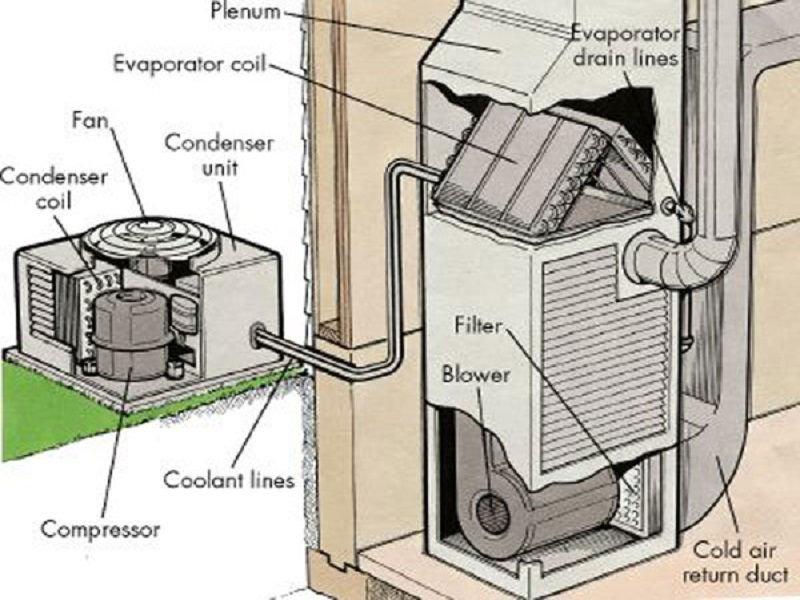Keep your air conditioning healthy all time with these simple tips: HVAC Guide
- greenleaf2461
- Sep 6, 2022
- 3 min read
Air conditioning has become common today, but what do you know about this heating and cooling mechanism? Did you know that you can keep your air conditioning healthy all time with the proper knowledge and tips? If you need some help, this post is for you! So keep reading to get some helpful advice about air conditioning.
Why should I care about my air conditioner?
When summer arrives, we naturally look forward to spending more time outdoors and getting hot, especially when it is really hot. This is the perfect moment to get rid of those winter clothes and enjoy those long sunny days in the park or near the pool. But unfortunately, many other factors make us reach for our AC when the temperature rises.
Check your filters regularly
Filters play a crucial role in keeping your air conditioner clean and making sure that it runs properly. When they get dirty, they affect the air quality in your house. To stay healthy, you should always change your filters at least once a month.
What causes damage to my system?
Several factors could cause the unit to break down over time, including improper installation, excessive humidity, mold or mildew formation, leaks, etc. To ensure that nothing happens to your equipment, follow these steps:

Clean the condenser coils regularly- Dirty coils cause a loss of efficiency. You should check them at least once a month to determine their condition. Remove any dust and debris buildup before trying to start the system again. Never allow pets and children near the system; they may get injured by the compressor's moving parts.
Check ductwork- Ensure vents do not close off completely and that fans are working correctly. To locate where the problem might occur, use tape and mark the position of each vent. Once you find the problem area, clear away obstructions and inspect the ductwork for cracks or holes.
Be aware of the weather conditions that may affect your system- For example, high temperatures and humidity levels slow down the cooling effect of the system and increase its power consumption. On the flip side, low temperatures and dry winds allow moisture to enter the system, increasing the risk of mold and mildew.
Fix leaky duct holes- A leak in a duct could result in a serious mess. Don't forget to patch small holes in duct work where the rubber material breaks down. Keep in mind that ductwork is not meant for handling hot/cold air only.
Seal off leaks- Most people don't realize how much moisture can leak from an AC unit. Leaks can result in mold problems. Make sure to keep the area well-ventilated.
Check Your Humidity Levels- Check how much humidity is inside your home. For example, when the temperature drops below 60 degrees Fahrenheit, your home should hold 40 percent relative humidity (RH). If you notice that your house feels drier than normal, or you find yourself sweating more often, it's time to invest in a humidifier. These devices add moisture to the air to help maintain your ideal humidity level.
Adjust Furnace Settings- If your furnace is older, you might want to adjust settings depending on where you live. Older furnaces tend to operate more slowly. Therefore, if you live in colder climates, try using a lower airflow setting to slow down the heating cycle. On the other hand, if you live in warmer regions, try increasing the airflow.
Reduce Outdoor Dampness- Drink it away if you're near a pond or lake. Water collects in basements and pools, causing mold and mildew issues and dampening the air quality inside. Drainage systems also help to reduce flooding risk in your home.
Check Refrigerant Level- Air conditioners use refrigerants to keep the room cool. Unfortunately, the levels of these chemicals can affect the performance of an air conditioner. The most crucial issue for an air conditioner is the refrigerant level. When it is low, you may not be able to cool your room as well as you should. So, check the refrigerant level to make sure the running AC smoothly.
Tips to avoid damage
If you're looking for some pointers to keep your air conditioner functioning well, take note of these guidelines:

Don't install the unit in damp locations. Make sure the area is arid before installing it.
Install the system outside or at least 30 feet away from windows, doors, vents, and other openings. Cover the exterior unit with plywood or plastic sheeting with at least three inches of clearance around the unit.
Keep the fan blades turning slowly and uniformly. Avoid sudden changes in direction. Also, look out for broken fans.
Take care not to place objects near the unit's ductwork. Doing so makes it difficult to ventilate the room because the airflow becomes obstructed properly.
Bottom Line
In conclusion, these tips will help keep your HVAC system healthy. So follow these tips to maintain your unit in good condition and keep your home cool and comfortable all year round.



Comments